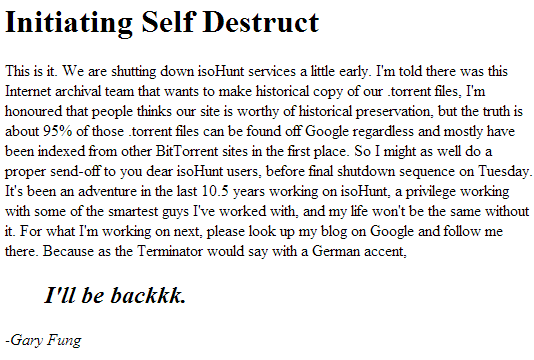Pirate Bay Founder Urges Sweden to Stop His Extradition (Updated)
mardi 22 octobre 2013 à 15:59 Last month Pirate Bay founder Gottfrid Svartholm had his hacking sentence reduced from two to one year in prison.
Last month Pirate Bay founder Gottfrid Svartholm had his hacking sentence reduced from two to one year in prison.
The Court of Appeal upheld the guilty verdict in the hacking of IT company Logica, but overturned the guilty verdict handed down in respect of the breach at the Nordea bank.
Following the new verdict Gottfrid is set to be released early next year. However, since he is wanted in Denmark in a separate hacking case the Swedish authorities are planning to extradite the 29-year old next week.
In Denmark, Gottfrid is accused of hacking into the mainframe of IT company CSC and downloading a large number of files, including police records. The Danes successfully requested Gottfrid’s extradition earlier this year when they described the CSC hack as similar to the Nordea one in Sweden.
Gottfrid previously asked the Danish authorities to drop his case. He apologized that his computer was used for the CSC hack, but stressed that this was not his wrongdoing. Thus far this request has been without result and in a final attempt to stop his pending extradition the Pirate Bay founder has now turned to the Swedish Government.
In an open letter he points out that two crucial issues have to be addressed before the extradition can take place.
Firstly, Gottfrid notes that the arrest warrant he received was incomplete. It didn’t include a detailed description of the circumstances of the alleged crime, its location or the nature of his involvement. In addition, he didn’t have the opportunity to read the attachments that were referenced in the warrant, which were in Danish.
The second issue is the question of whether the Danish case is similar to the one Gottfrid has been tried for in Sweden already. The appeals court previously cleared Gottfrid of the Nordea hacking charges and because of the similarity between the cases he believes this should also apply to the Danish charges.
“It was found that my computer could have been controlled remotely, and that it had acted as a ‘computer lab’/ server, accessible to a wider audience. I could therefore not be held responsible for what was found on it. Liability was thus tried in Sweden for something that very closely matches what Denmark wants to hold me responsible for,” Gottfrid writes.
“It must be investigated whether this act should be considered ‘the same offense’ or not,” he adds.
The Pirate Bay founder urges the Swedish Government to keep him in Sweden until these uncertainties have been resolved. If they proceed with the extradition it would be a violation of international law, he notes.
“Overall, I argue that an extradition, if it is executed before [these two issues] have been investigated further, would be contrary to international law and what is to be guaranteed by the European Convention of 4 November 1950 on the Protection of Human Rights and Fundamental Freedoms.”
Below is a translated copy of the open letter (Swedish original with references).
This Friday the Swedish sentence against Gottfrid will be made final, and if the defense does not appeal, he will be extradited within five days.
Update: A few minutes after we published this article the news broke that Gottfrid will appeal his case at the Supreme Court in Sweden.
This means that the extradition is not going through next week. It’s likely to take months before the Supreme Court will decide on the matter, at which point Gottfrid will have served his sentence.
—
Re.: Possible upcoming Swedish crimes against international law and international agreements
I want to make the Swedish government aware that Sweden is about to violate Nordic, European and international agreements in that the Swedish authorities intend to surrender me to Denmark in accordance with a Nordic arrest order, issued in May 2013.
I would like to state the following :
(1) Formal errors were made in terms of the warrant form, of the information I have received on its contents as well as in terms of my rights to have this presented in the Swedish language:
I have not received any detailed description of whether the circumstances of the crimes I am suspected of in Denmark , the location of it or what my involvement in it could mean .
In the arrest warrant there are references to attachments that I have not had the opportunity to read. In a police interrogation , I could browse through a stack of paper that may possibly have been those attachments, but I do not know. They were also only in the Danish language.
(2) Before any extradition it must be determined whether an earlier indictment against me for hacking and fraud / attempted fraud against the Danish Nordea is considered as an indictment of the ‘same offense’ or not. Here are additional facts emerged since the warrant was issued :
I was cleared of suspicion as above by the Court of Appeals (Svea Hovrätt) on 25 September 2013. It was found that my computer could have been controlled remotely, and that it had acted as a ‘computer lab’/ server , accessible to a wider audience. I could therefore not be held responsible for what was found on it.
Liability was thus tried in Sweden for something that very closely matches what Denmark wants to hold me responsible for. It must be investigated whether this act should be considered ‘ the same offense’ or not.
The liability trial that the Court of Appeals has conducted also brings something that the Nordic governments have agreed about: “The system with a Nordic arrest is based on a high degree of trust between the Nordic States.” This trust should also apply to evidence trials and verdicts in each country.
Overall, I argue that an extradition, if it is executed before (1) and (2) have been investigated further, would be contrary to international law and what is to be guaranteed by the European Convention of 4 November 1950 on the Protection of Human Rights and Fundamental Freedoms .
Häktet I Sollentuna
Gottfrid Svartholm Warg
Source: Pirate Bay Founder Urges Sweden to Stop His Extradition (Updated)


 After a legal battle of nearly eight years isoHunt founder Gary Fung announced the
After a legal battle of nearly eight years isoHunt founder Gary Fung announced the 
 A lot of music genres wouldn’t exist without samples, but too much sampling can sometimes fray tempers.
A lot of music genres wouldn’t exist without samples, but too much sampling can sometimes fray tempers.


